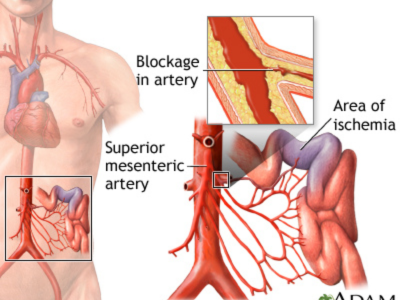Understanding Mesenteric Vascular Disease
Mesenteric vascular disease refers to the restricted blood flow to the intestines due to arterial blockages or narrowing, leading to inadequate oxygen supply to the intestinal tissue.
Definition and Types:
Mesenteric vascular disease encompasses chronic mesenteric ischemia and acute mesenteric ischemia. Chronic mesenteric ischemia is characterized by progressive arterial narrowing, while acute mesenteric ischemia involves a sudden blockage of blood flow.
Causes and Risk Factors:
The primary causes of mesenteric vascular disease include atherosclerosis (accumulation of plaque in the arteries), blood clots, embolisms, arterial dissection, or vasculitis. Risk factors include advanced age, smoking, high blood pressure, high cholesterol, diabetes, and a history of vascular disease.
Symptoms and Signs
Mesenteric vascular disease can present with various symptoms depending on the type and severity of the condition.
Chronic Mesenteric Ischemia Symptoms:
Chronic mesenteric ischemia is characterized by postprandial (after eating) abdominal pain, unintentional weight loss, fear of eating (due to pain), and altered bowel movements.
Acute Mesenteric Ischemia Symptoms:
Acute mesenteric ischemia is a medical emergency and presents with severe abdominal pain, nausea, vomiting, bloody stools, and signs of shock (rapid heart rate, low blood pressure).
Diagnosis and Evaluation
Accurate diagnosis of mesenteric vascular disease involves a thorough evaluation and diagnostic tests.
Medical History and Physical Examination:
A detailed medical history and physical examination are conducted to assess symptoms, risk factors, and signs of mesenteric vascular disease. The abdominal examination may reveal tenderness or signs of acute abdominal distress.
Imaging Tests:
Imaging techniques such as CT angiography, magnetic resonance angiography (MRA), or duplex ultrasound can visualize the blood vessels, identify blockages or stenosis, and evaluate blood flow.
Angiography and Mesenteric Duplex Ultrasound:
Angiography is a more invasive procedure where contrast dye is injected into the arteries to obtain detailed images of the blood vessels. Mesenteric duplex ultrasound uses sound waves to assess blood flow and detect abnormalities.
Treatment Options for Mesenteric Vascular Disease
Treatment for mesenteric vascular disease aims to restore blood flow to the intestines and relieve symptoms.
Medications:
Medications such as antiplatelet agents, anticoagulants, or vasodilators may be prescribed to manage symptoms, prevent blood clots, and improve blood flow.
Endovascular Interventions:
Endovascular procedures, such as angioplasty and stenting, can be performed to open narrowed or blocked arteries, improving blood flow to the intestines.
Surgical Procedures:
In cases where endovascular interventions are not suitable or effective, surgical procedures like bypass surgery or endarterectomy may be performed to bypass or remove the diseased segment of the artery, restoring blood flow.
Recovery and Lifestyle Modifications
Recovery from mesenteric vascular disease involves post-treatment care and lifestyle modifications to improve overall vascular health.
Post-Treatment Care:
Following treatment, close monitoring and follow-up care are necessary to evaluate treatment effectiveness and manage any complications. Regular check-ups and imaging tests may be recommended.
Dietary Recommendations:
A healthy, well-balanced diet low in saturated fats and high in fruits, vegetables, and whole grains is recommended. Avoiding large meals and focusing on smaller, more frequent meals can help alleviate postprandial pain.
Smoking Cessation and Exercise:
Smoking cessation is crucial as smoking narrows blood vessels and worsens symptoms. Regular exercise and physical activity promote cardiovascular health and improve blood flow.
Frequently Asked Questions (FAQs):
Seeking Expert Vascular Care
At VascularHyd, we specialize in providing comprehensive care for mesenteric vascular disease. Our experienced team, led by Dr. Rahul Agarwal, is dedicated to delivering personalized treatment plans and improving patients' quality of life.
Why Choose VascularHyd?
- Expertise in mesenteric vascular disease management
- State-of-the-art facilities and advanced imaging technologies
- Highly skilled vascular surgeons and medical professionals
- Patient-centered care and individualized treatment plans
- Comprehensive post-treatment care and follow-up
Contact us today to schedule a consultation and discuss your mesenteric vascular disease concerns.
